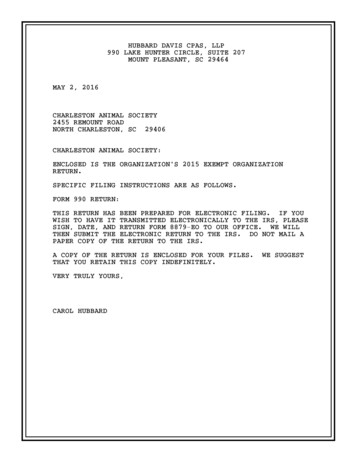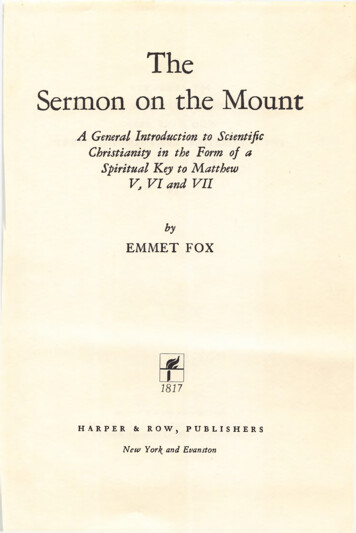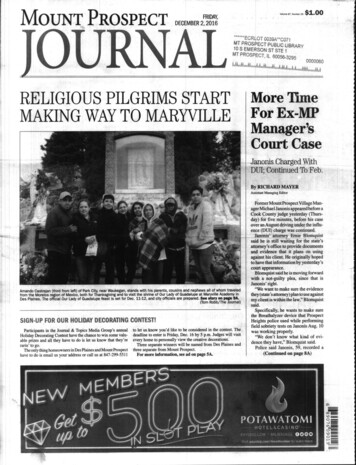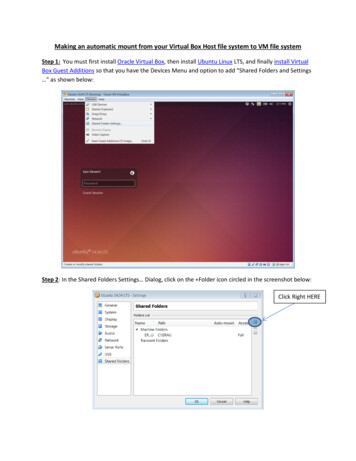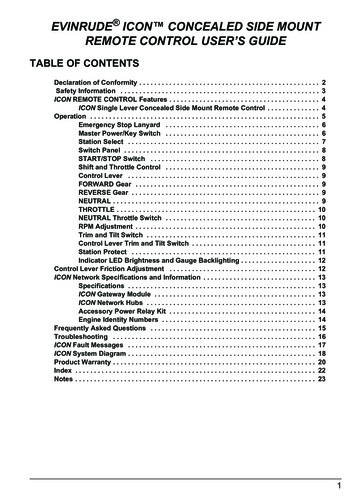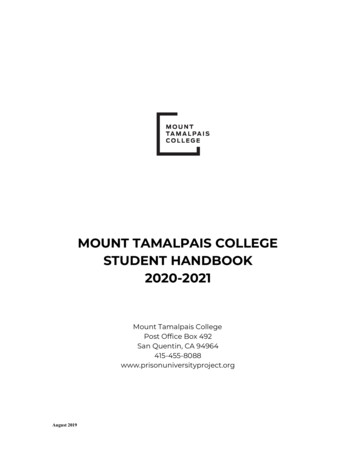
Transcription
MOUNT TAMALPAIS COLLEGESTUDENT HANDBOOK2020-2021Mount Tamalpais CollegePost Office Box 492San Quentin, CA gust 2019
TABLE OF CONTENTSGeneral InformationMission Statement and GoalsAccreditationAdministrative StaffBoard of DirectorsProgram Learning OutcomesRequired Courses for the Associate of Arts in General StudiesRequired Courses for Junior Transfer Eligibility to a 4-year State UniversityCollege Preparatory ProgramAcademic AdvisingStudent SupportStudy hallEnrollment and Registration3334567899910Course CalendarAdmissionsNew Student OrientationAssessmentsRegistration Procedures and InformationTransferring Credits11111111111214Requesting Transcripts or Letters Confirming EnrollmentPetitioning to Graduate1414Policies and Expectations1515151 516171819Attendance and TardinessGradingTextbooks and Course MaterialsAcademic Honesty PolicyCode of ConductStudent ComplaintsAcademic FreedomCoursesCourse Numbers and TitlesAugust 202021211
August 20202
GENERAL INFORMATIONMISSION STATEMENT AND GOALSOur MissionThe mission of Mount Tamalpais College is to provide an intellectually rigorous,inclusive Associate of Arts degree program and college preparatory program, free ofcharge, to people at San Quentin State Prison; to expand access to quality highereducation for incarcerated people; and to foster the values of equity, civic engagement,independence of thought, and freedom of expression.Our GoalsThe central goals of Mount Tamalpais College are to educate and challenge studentsintellectually; to prepare them to lead thoughtful and productive lives inside and outsideof prison; to provide them with skills needed to obtain meaningful employment andeconomic stability post-release; and to prepare them to become leaders and engagedcitizens in their communities.Through courses and other opportunities on campus, as well as other education andoutreach activities, Mount Tamalpais College also aims to challenge popular myths andstereotypes about people in prison; to publicly raise fundamental questions about thepractice of incarceration; and to incubate and disseminate alternative concepts ofjustice, both within and beyond the academy.Non discriminationMount Tamalpais College does not condone discrimination with regard to race, color,national origin, religion, sex, sexual orientation, age, disability or veteran status inenrollment or employment, nor in the educational programs or activities which itoperates.ACCREDITATIONFrom the time of our founding in 1996, through 2019, the College Program at SanQuentin operated an extension site of Patten University—our accredited universitypartner. Students enrolled in credit courses were registered at, and ultimately receivedtheir degrees from, Patten. In turn, our program was responsible for day-to-dayprogram administration at the San Quentin extension site, along with teacherrecruitment, training and supervision.August 20203
Mount Tamalpais College is now a Candidate for Accreditation by the AccreditingCommission for Community and Junior Colleges, Western Association of Schools andColleges, 10 Commercial Blvd., Suite 204, Novato, CA 94949, (415) 506-0234, aninstitutional accrediting body recognized by the Council for Higher EducationAccreditation and the U.S.Department of Education. Additional information aboutaccreditation, including the filing of complaints against member institutions, can befound at: www.accjc.org.Candidacy for Accreditation is a status of preliminary affiliation with the Commissionthat is initially awarded for two years. Candidacy does not assure eventualaccreditation.ADMINISTRATIVE STAFFExecutiveJody Lewen, Executive DirectorWendy Quezada, Executive AssistantCollege ProgramAmy Jamgochian, Chief Academic OfficerDeirdre Judge, College Preparatory Writing Program CoordinatorAllison Lopez, Learning SpecialistMarvin Mutch, Program AssistantDavid Durand, Director of Student AffairsDerrius Jones, Student Affairs AssistantArthur Jackson, ClerkCorey McNeil, ClerkOperationsReed Goertler, Chief Operations OfficerDavid Cowan, Operations ManagerDmitriy Orlov, Office ManagerDevelopmentLauren Hall, Development DirectorSharyl McGrew, Grants OfficerJared Rothenberg, Development AssociateAugust 20204
BOARD OF DIRECTORSPatrice Berry, Director of College Track, East Palo AltoWill Bondurant, Chief Financial Officer, Castlight Health and Instructor for Mount TamalpaisCollegeJames Dyett, Enterprise Sales at Stripe and Instructor for Mount Tamalpais CollegeJeff Feinman, MNA, Bay Area Executive Director of Springboard CollaborativeLilly Fu, Treasurer, Currently serves as the Senior Director, Finance & Administration at theGeorge Lucas Educational FoundationSia Henry, JD, Senior Program Associate with the National Prison Rape Elimination Act(PREA) Resource CenterConnie Krosney, EdD; Retired professor of Education, and Mount Tamalpais College writingtutorLarry Norton, Trustee Emeritus, California State UniversityElana Leoni, MBA, Founder and CEO of Leoni Consulting Group LLCHaley Pollack, PhD, Principal of College and Career Pathways at Five Keys Schools andPrograms. Former Mount Tamalpais College instructor and writing tutorKathy Richards, JD, Retired from solo law practice focused on family and dependency law,Instructor for PUP and coach for PUP Ethics BowlTheresa Roeder, PhD, Professor of Decision Sciences in the College of Business, San FranciscoState, Mount Tamalpais College math tutor and business/communications instructorMaddy Russell-Shapiro, EdM, Board Chair; Independent radio producer and educationconsultantAly Tamboura, Software engineer and Manager of Technology & Program Delivery at the ChanZuckerberg Initiative, Mount Tamalpais College graduateAugust 20205
PROGRAM LEARNING OUTCOMESWritten and Oral Communication : Students will be able to communicate clearly andeffectively in written and oral forms in a broad array of social, professional, academic, andcivic contexts.Quantitative Reasoning : Students will be able to use a variety of quantitative methods,including arithmetical, algebraic, geometric and statistical methods, to understand and solveproblems.Research and Information Competency : Students will be able to locate, evaluate, analyze,interpret, and synthesize a broad range of source materials.Critical Thinking : Students will be able to think independently and creatively, to develop selfand other-awareness, including the ability to see the world through multiple perspectives, andto integrate these skills into daily life.Values : Students will be able to articulate and to critically reflect upon their own values and thevalues of others. They will be able to identify ethical concepts and principles, and to use themin reasoning.Global Awareness : Students will be able to demonstrate an awareness of a complex andinterdependent world beyond their own surroundings and communities, and anunderstanding of their identities and actions as part of and related to that world.August 20206
REQUIRED COURSES FOR THE ASSOCIATE OF ARTS IN GENERALSTUDIESThere are 20 courses required for a total of 61 units. All courses are worth 3 units withthe exception of science with lab, which is worth 4 units. However, most students startin non-credit English and/or math classes before moving on to the credit coursesrequired for the degree:The non-credit college preparatory courses are: ENG 99A: Developmental English IENG 99B: Developmental English IIMTH 50A: Developmental Math IMTH 50B: Developmental Math IIMTH 99: Elementary AlgebraThe required credit courses for the degree are:EnglishCourse:ENG 101A: Reading and CompositionENG 101B: Critical Thinking, Reading, and WritingENG 102: Introduction to LiteratureENG 204: Interdisciplinary Reading, Writing, and ResearchCOM 146: CommunicationPrerequisite:By placement or ENG 99BENG 101AENG 101BENG 101BENG 101BMath/ScienceCourse:MTH 115: Intermediate AlgebraScience with Lab (e.g. Biology, Chemistry, Physics)Non-lab science (e.g. Neuroscience, Public Health)Prerequisite:By placement or MTH 99MTH 115 and ENG 101BMTH 115 and ENG 101BHistory/Social SciencesCourse:US History (e.g. U.S. History I, U.S. History II)POL 241: American GovernmentSOC 230: SociologyPsychology (e.g. General Psychology, Social Psychology)Prerequisite:ENG 204ENG 204ENG 204ENG 204August 20207
HumanitiesCourse:SSC 202: Comparative ReligionPHL 270: EthicsArt History and Appreciation (e.g. Introduction to Film, TheatreImprovisation)PHL 271: Introduction to PhilosophyPrerequisite:ENG 204ENG 204ENG 204ENG 204ElectivesStudents are required to take four elective courses in addition to the courses requiredfor the core curriculum. The following courses are encouraged because they allowstudents to fulfill requirements for transfer to UC and Cal State schools:Course:SPA 101: Elementary Spanish ISPA 102: Elementary Spanish IIMTH: 135: StatisticsMTH 220: Pre-Calculus IMTH 221: Pre-Calculus IICOM 210: JournalismPrerequisite:ENG 101ASPA 101MTH 115MTH 115MTH 220ENG 204Other possible electives are courses that students haven’t taken before that fulfill arequirement they have already fulfilled. For example, if a student has already takenIntroduction to Psychology to fulfill the Psychology requirement, Child Growth andDevelopment counts as an elective.REQUIRED COURSES FOR JUNIOR-TRANSFER ELIGIBILITY TO A4-YEAR STATE UNIVERSITYThe credits students earn by gaining an Associate of Arts degree do not fulfill all of therequirements for transfer eligibility to a UC or Cal State Bachelor of Arts program. Thefollowing is a list of courses that students must take in addition to the core requirementsof the Associate of Arts degree in order to fulfill the requirements of transfer eligibility.NOTE: Students must earn a “C” or better in any course in order to transfer credit.All courses required for the A.A. degree plus:August 20208
Math/Science:MTH 135: StatisticsMTH 220: Pre-Calculus IMTH 221: Pre-Calculus IIHumanities:SPA 101 (Elementary Spanish I)SPA 102 (Elementary Spanish II)COLLEGE PREPARATORY PROGRAMThe majority of students begin the program by taking college preparatory math andwriting courses to develop or brush up on their basic skills before taking for-creditcourses. The college prep courses also help new students to adjust to the class scheduleand workload without having to worry about receiving a grade. After attending the NewStudent Orientation, all prospective students are required to take both a math and awriting assessment. While some students do place directly into for-credit courses, themajority begin in the college prep classes and as a result tend to do better in their studieslater on.The college prep courses do not count as credit towards the A.A. degree. All studentswho fully participate in the courses receive an institutional note of recognition forparticipation, and a written evaluation from their instructor that informs them whetherthey have passed the course or will have to repeat.ACADEMIC ADVISINGCollege administrators hold academic advising sessions with students at two points asthey progress through the degree: while students are in English 204 and when studentshave completed at least 34 units. Students are also invited to request academic advisingconferences as needed. Students preparing to parole are particularly encouraged toconference with an MTC administrator.STUDENT SUPPORTAny student seeking learning support may access the following resources: Mount Tamalpais College’s library, from which students may borrow books andrequest materials; research materials from research databases through the Article Request Formavailable from the College Clerks; weekly designated tutors in study hall for College Preparatory Math and Englishcourses, as well as for Intermediate Algebra, English 101 A & B, English 204(Research), and other credit courses;August 20209
math study groups in Study Hall; conferencing with the Learning Specialist, Allison Lopez, who providesintensive, individualized support; on-demand conferences with Program Team staff to help students withstrategies for learning and studying, concerns about coursework or attendance,and planning for future terms and graduation; regular workshops on writing, grades, study skills, reading strategies, andtime-management; access to student Teaching Assistants in some classes, who can offer peertutoring and support to students outside of class; individualized student accommodations, including specialized materials,extended time on tests, and one-on-one proctoring.STUDY HALLStudy hall is offered six times per week when courses are in session: 6-8PM on Sundays,Mondays, Wednesdays, Thursdays, and Fridays and 9:15AM-12PM on Fridays. Study hallbegins one week after the start of each semester. Students can sign up for study hallduring the first week of classes, or at any point over the course of the semester. Studentsmay use the space to study on their own or can sign up to meet with a math and/orwriting tutor. Tutoring is offered on a drop-in, first-come, first-served basis. Studentsare highly encouraged to take advantage of study hall.August 202010
ENROLLMENT AND REGISTRATIONCOURSE CALENDARMount Tamalpais College runs three thirteen-week terms per year, starting in January,May, and September. Holidays accord to California state holidays, as observed by theDepartment of Corrections and Rehabilitation. Semesters are 13 weeks long, but MountTamalpais College reserves 15 weeks in case classes need to be rescheduled due toinstitutional interruptions.ADMISSIONSAll mainline San Quentin inmates with a GED or high school diploma are admitted to the college.We enroll new students at the beginning of each semester. If prospective students areinterested in enrolling, they should speak with an MTC administrator in Education.Alternatively, they may send a note with their name and CDC# to “Mount TamalpaisCollege, Education Dept.” Once we receive a prospective student’s information, we willadd the student to our waitlist send a letter indicating that the student has been added.When we have space to enroll the student in classes, we will invite the student to attenda New Student Orientation, in the order of waitlist signup.NEW STUDENT ORIENTATIONAll new students must attend a New Student Orientation, where they will be introducedto the history, policies, expectations, and offerings of the college, and assisted incompleting enrollment paperwork. All students must complete an A pplication forAdmission and a GED Transcript or High School Diploma Request Form .ASSESSMENTSAll new students are required to take math and English assessments after attending anorientation. These assessments are not graded, but rather are a means for students toshow their skills so that they are placed in the class that best addresses their needs.Please note that students are required to take both assessments. Students will benotified of the results of their assessments by mail.August 202011
REGISTRATION PROCEDURES AND INFORMATIONREGISTRATION FORMSAll students must complete and submit a registration form by the registration deadlineevery semester they wish to participate in courses.EARNING CREDITSAcademic credit is awarded based on the Carnegie unit. To receive one trimester unit ofcredit, a student spends fifteen hours in class during a term. For each hour of time inclass, students are expected to complete approximately two hours of out-of-class workrelated to classroom learning (e.g., homework).REQUESTING TO AUDITStudents may elect to “audit” a course, meaning that they must comply with theattendance regulation of the instructor, but are relieved of completing written work(assignments, tests, and examinations) associated with the course. To audit a course,complete the registration form by writing “audit” in the section marked “credits.”Audited courses cannot be used to satisfy graduation requirements and do not appearon transcripts. Note that requests to audit courses are dependent on enrollment numbers, andpriority will be given to students taking the course for credit.ADD/DROP PERIODThere is an “add/drop” period at the beginning of each semester. Courses droppedduring the “add/drop” period will not appear on the student’s transcript. Students mustsubmit a completed add/drop form in the Education office by the add/drop deadline inorder to successfully drop a course.COURSE WITHDRAWALStudents may withdraw from a course after the “add/drop” period is over. They mustcomplete and submit the withdrawal form in the Education office by the withdrawaldeadline in order to officially withdraw. A grade of “W” will be recorded on the student’stranscript. Please note that students are highly encouraged to consult with instructorsand/or MTC administrators prior to withdrawing from a course.August 202012
ADMINISTRATIVE DROPSIn rare cases, a course may be removed from a student’s record after the add/dropperiod if the student is unable to attend. Administrative drops are given when a studentis prevented from attending classes for institutional reasons beyond the student’scontrol. Reasons for removal include involuntary transfer away from San Quentin,parole, segregation for safety or discipline, and quarantine or lockdown of students’housing unit for a significant period during the semester.INCOMPLETESAn “I” may be given to a student doing acceptable work who has been unable to completecourse requirements on time due to extreme illness or a verifiable interruption such asgoing to ad-seg, surgery, or being out at court. Students are only eligible for anincomplete in a course in which they have five or fewer absences and have successfullycompleted 80% of the work required for the course. An “incomplete” incurred in anysemester MUST be made up within 45 days of the last day of the semester, though anextension may be granted on the original 45-day period for justifiable reasons.Arrangements for an “incomplete” grade are made between the faculty member and thestudent. A form must be submitted to MTC administrators at the time final grades aredue. An “incomplete” not made up within the allotted time will be automaticallyconverted to a final grade of “F.”REPEATING COURSESStudents may repeat a course previously taken in an attempt to improve a grade if thegrade is lower than a “C.” All grades, including the grade for the repeated course, willappear on the student’s transcripts. No additional credit may be earned if the previousgrade was a “C” or better.PETITIONING FOR A GRADE CHANGEStudents should submit a note in writing to program administrators as soon as possibleif there is concern about a grade received.August 202013
TRANSFERRING CREDITSStudents may transfer a maximum of 5 classes from accredited colleges and universitiesthat fulfill comparable degree requirements for Mount Tamalpais College’s AA degree.However, students are required to complete the core English and math courses andscience with lab through Mount Tamalpais College, so cannot fulfill those requirementswith transfer credits. Students may request to transfer credits after completing English204.Students who have earned credit from a college or university attended previously andwish to transfer credits to Mount Tamalpais College should complete and submit a“ Transcript Request Form ,” which is available in the office in Education. On the basis ofan evaluation of the transcripts, appropriate transfer credit will be awarded. Fulltransfer credit will be given for courses that carry a grade of “C” or above and arecomparable to courses in Mount Tamalpais College’s catalog. Transfer grades are notplaced on the Mount Tamalpais College transcript.REQUESTING TRANSCRIPTS OR LETTERS CONFIRMINGENROLLMENTStudents who completed credits through Patten University a t San Quentin between thedates of 1996 and January 17, 2020 and who have left San Quentin m ay obtain transcriptsvia P archment. Instructions for ordering transcripts can be found h
ACCREDITATION From the time of our founding in 1996, through 2019, the College Program at San Quentin operated an extension site of Patten University—our accredited university partner. Students enrolled in credit courses were registered at, and ultimately received their degrees from, Patten
